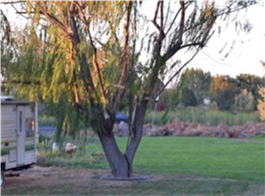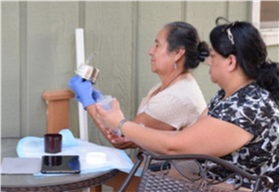Partnerships for Environmental Public Health (PEPH)
Study Location: Yakima Valley, Washington State
Academic Partners:
University of Washington
Catherine Karr, M.D., Ph.D.
Community Partners:
El Proyecto Bienestar
Northwest Communities’ Education Center / Radio KDNA
Yakima Valley Farm Workers Clinic
Project Description

This community-based participatory research project seeks to improve the health of Latino children living in the Yakima Valley of Washington State, an area of intense agricultural production. Pediatric asthma is a priority health concern for families and health care providers in the area. Previous research identified poor air quality — specifically, particulate matter and ammonia — as a local risk factor for asthma morbidity.
Since children spend most of their time indoors, this project will test an intervention that places portable high efficiency particulate air (HEPA) cleaners in the child's sleeping area and living room. The study will include 75 children with poorly controlled asthma who live within 400 meters of crop production or dairy operations, recruited through the Yakima Valley Farm Workers Clinic. The study will characterize key indoor pollutant exposures for the study participants. Study design, procedures, and return of research results to community members are conducted by El Proyecto Bienestar, a longstanding partnership between the University of Washington and local community organizations.

The project’s aims are to:
- Build on a well-established community-based participatory research program to engage community partners in the design, implementation, and evaluation of an asthma intervention study.
- Conduct a year-long intervention that will measure changes in key exposures to substances that can provoke asthma symptoms and other health conditions.
- Develop and characterize measures of the project’s impact and outcomes.
- Promote sustainable public health action via positive and transparent communications about the project to participants, local stakeholders, and state-level policy makers through broad community outreach.


